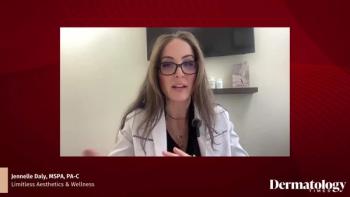
Renata Block, MMS, PA-C, Discusses the Role of the Dermatology PA Foundation in Supporting Physician Assistants
Key Takeaways
- The DPAF is rebranding to focus on community outreach, medical missions, research, and professional development for dermatology PAs.
- Dermatology PAs play a crucial role in reducing patient wait times, providing timely diagnoses, and improving patient outcomes.
Renata Block, MMS, PA-C, talks about the role of physician assistants in dermatology and related organizations in supporting PAs.
Renata Block, MMS, PA-C, is a dermatology physician assistant practicing at Advanced Dermatology & Aesthetic Medicine in Chicago, Illinois. She is also the chair of the Dermatology PA Foundation (DPAF) and the immediate past president of the Society of Dermatology Physician Assistants (SDPA).
Block spoke with Dermatology Times® to discuss the organization's mission and role in supporting PAs in dermatology.
Renata Block, MMS, PA-C: Hi, my name is Renata Block. I am a dermatology physician assistant based in Chicago, Illinois.
Dermatology Times: What is the Dermatology PA Foundation?
Block: So I am very excited, because I am the chair of the DPAF, so Dermatology PA Foundation, and we're rebranding it. It was founded in 2015, and we really focus on community outreach. This past year, like I said, we are rebranding it, and our focus is not only community outreach, but what we can give our members.
Dermatology Times: What was the inspiration behind the DPAF rebrand?
Block: So the DPAF is a supporting organization of the SDPA; we wanted to do both. The last 12 months, we've been focusing on what is important to PAs what's important to the community. And we have come up with 4 pillars, and that is:
Number 1: Community outreach
Number 2: Medical missions
Number 3: We want to do or focus on research
And then number 4: Professional development
So this allows our members to get involved in things outside of what they do in the practice. But it also helps the community in regards to education about disease states. And then finally, it really focuses on the dermatology PA and the importance of what we bring to the healthcare system: the integral role that we play in healthcare. So it's a win-win kind of platform, because we as PAs get to give to the community, but then also have the opportunity to be involved in other things outside of the clinic.
Dermatology Times: What does it mean to you to be a PA in dermatology?
Block: So being a dermatology PA is very important because we are able to see a patient much sooner than the dermatologist. Typically for dermatology, wait time, it can be 3 to 6 months. But if you want to be seen sooner, you can definitely see a dermatology PA. So I think that is really a public service, giving access to the public to be seen sooner: diagnosing that melanoma sooner, saving that person's life because of that diagnosis, getting a teenager in with their severe acne and getting them started on their treatment. Having a skin disease is something the public can see, and it brings a very strong emotional state of mind to the person with that diagnosis. And the sooner they can be seen and treated, the better.
Dermatology Times: How do the DPAF and SDPA support dermatology PAs?
Block: So the SDPA is the largest specialty organization within the United States. We are a force, and we are a well-oiled machine. Our conferences are curated by PAs, we know what PAs want, we know the education that they need, and then we also know what they need in regards to professional development. Having those 2 nonprofit organizations together is just going to accelerate what we can do in the future.
[Transcript edited for clarity]
Newsletter
Like what you’re reading? Subscribe to Dermatology Times for weekly updates on therapies, innovations, and real-world practice tips.









